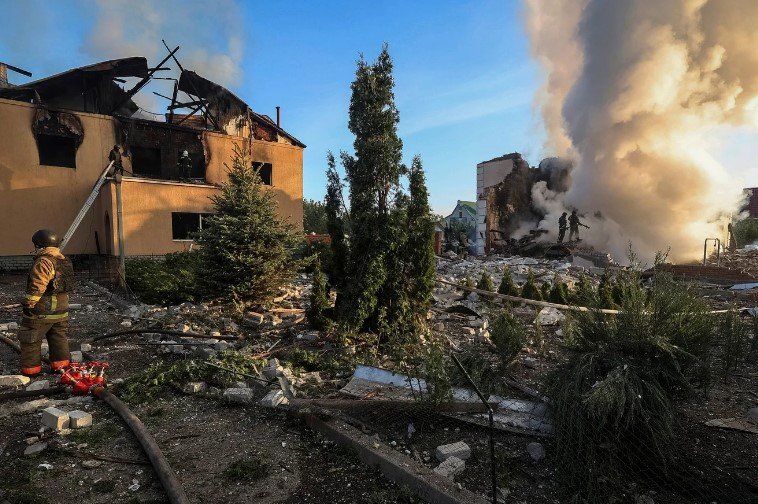A fresh wave of violence has struck Ukraine as Russia presses forward with territorial advances and Ukrainian President Volodymyr Zelensky calls on Western allies for critical military aid. A recent airstrike on Kharkiv left devastating scenes, claiming the life of a child and injuring numerous civilians. Meanwhile, concerns over foreign intervention are rising, as reports emerge of North Korean soldiers possibly joining Russian forces. The situation underscores the intensifying complexity of the conflict and the increasing strain on Ukraine’s defenses.
Kharkiv Struck by Deadly Airstrike
In one of the most recent escalations, a Russian guided bomb struck a high-rise apartment building in Kharkiv, Ukraine’s second-largest city. The blast killed a young boy and injured at least 29 people. Rescue teams raced against time, pulling an 11-year-old from the rubble, though tragically, he could not be saved due to severe injuries.
The Kharkiv regional governor, Oleg Synegoubov, provided details on the incident through Telegram, describing the destruction as catastrophic, with a massive hole tearing through the building’s structure. Footage captured by Reuters Television showed the aftermath, with emergency responders sifting through concrete and twisted metal to save those trapped. This attack adds to the long list of Russian assaults on Ukrainian civilian areas, putting relentless pressure on Ukraine’s emergency services and fueling calls for more international support.
President Zelensky emphasized the urgency of military aid, sharing his plea on Telegram. He warned that every delay in aid decisions translates to further loss of lives and increased bombardment on Ukrainian soil. “Our partners can see what is happening every day,” Zelensky wrote, stressing that time is of the essence.

Russia’s Advance in Eastern Ukraine
On the battlefield, Russian forces are continuing to make gains. Moscow recently announced the capture of Kruhliakivka, a settlement near Kupiansk in the Kharkiv region, although Ukraine has yet to confirm the loss. Reports from Ukraine’s military indicate heavy clashes in the area, with forces engaged in fierce combat to repel Russian attacks across nine villages. Kupiansk itself has been under near-constant shelling and airstrikes, with civilian casualties reported, including six injuries from a recent attack.
Russia’s advance has been steady over the past few months. Ukrainian intelligence reports that Russian forces had been forced out of some areas earlier this month, yet recent battles have allowed Russian troops to reclaim ground. Moscow’s military achievements may be gradual, but they are stretching Ukraine’s defenses thin and straining its ability to counterattack effectively.
In Kyiv, the capital city has faced a relentless barrage of drone and missile attacks, marking the 19th strike this month alone. Ukraine’s air force reports having intercepted 33 out of 62 drones launched by Russia overnight. However, many drones reached their targets, causing significant damage, setting apartments on fire, and killing a 15-year-old girl in one of the attacks. Ukraine’s emergency services evacuated around 100 residents, showcasing the scale and persistence of the threat.
Rising Tensions Over North Korean Troops in Russia
A new twist in the ongoing war has emerged with reports of North Korean troops potentially entering Russia to support the war effort against Ukraine. The United States, South Korea, and Japan have voiced “grave concern” over this development, calling for an immediate halt to arms transfers between North Korea and Russia. These exchanges, they argue, violate UN Security Council resolutions, and White House national security spokesperson John Kirby expressed worry over the potential for North Korean soldiers to join the conflict.
The alliance’s statement followed comments by Russian President Vladimir Putin, who neither confirmed nor denied the presence of North Korean troops but stated that Moscow has a mutual defense treaty with Pyongyang. North Korea responded, emphasizing that any military cooperation would comply with international law.
The prospect of North Korean soldiers joining Russian forces has raised significant alarms. Deputy U.S. ambassador to the UN, Robert Wood, cautioned that North Korean troops may face fatal consequences if they engage in the Ukrainian conflict. South Korean Defense Minister Kim Yong-hyun added that North Korea might seek advanced weaponry from Russia in exchange for its military support, heightening fears of nuclear and ballistic missile proliferation.
Amid these concerns, South Korea is contemplating dispatching military observers to Ukraine to monitor any North Korean deployments firsthand. South Korean officials are worried that North Korea’s involvement could complicate the conflict and deepen the security risks for neighboring countries.
Western Allies Respond to Ukraine’s Pleas for Assistance
As Ukraine battles against relentless Russian advances and the prospect of foreign troops, the support of its Western allies remains crucial. President Zelensky’s recent statements underscore the severity of the situation, urging for a swift and decisive response from partners. However, the dynamics surrounding international aid are fraught with complexities, as nations weigh the geopolitical consequences of increased military support.
The possibility of North Korean involvement in the conflict may add urgency to these discussions. As the situation evolves, the international community faces difficult choices regarding how to respond to Russia’s widening alliances and escalating attacks on Ukrainian civilians. Zelensky’s plea reflects Ukraine’s dire need for resources to bolster its defenses and protect its citizens from further devastation.
In the face of mounting pressure and an increasingly complex battlefield, Ukraine’s resilience is being tested like never before. The outcome of this conflict may well depend on the speed and scale of the international support it receives in the crucial weeks and months ahead.
